Hello and welcome,
Of course, we are all shocked to witness the horrific attacks on Israel that have taken place over these past days. On Wednesday, I issued a statement on this situation that I would like to share with you here:
The sad and tragic historical truth is that the people of the Middle East have long suffered the scars and burdens of war. Even in this historical perspective, the massive military assault by Hamas on the State of Israel and its citizens stands as one of the worst moments in this long history. This act of aggression requires a clear condemnation in human, moral and legal terms. Both the purpose of the attack and its barbaric methods are devoid of moral or legal justification. There is no room for moral ambiguity on this issue. Resisting such terrorism and aggression is the moral duty of states to be carried out within moral limits.
While such moral judgement is necessary at this time, my primary focus as a Catholic bishop is one of prayer, condolence and sympathy for those who have lost parents, spouses and children during this past week. These sentiments extend also to the Palestinian civilian community and families in this conflict, for death is never confined to one side in war.
The United States is home to the largest Jewish community outside of Israel and many members of that community live in the Archdiocese of Boston. To them I offer solidarity and support in the midst of your suffering and sorrow.
As is his custom in addressing war and conflict, Pope Francis has affirmed the right of states and people to defend themselves while observing moral limits, and also urging every effort possible to move from conflict to its just resolution. As a step in that process I echo the Holy Father’s request that the hostages be released. I join the Holy Father in his pastoral care for all in war and his prayer for a just peace.
As you know, I have been in Rome taking part in the Synod on Synodality. We meet each day, sometimes in small groups, other times in what they call general congregation.
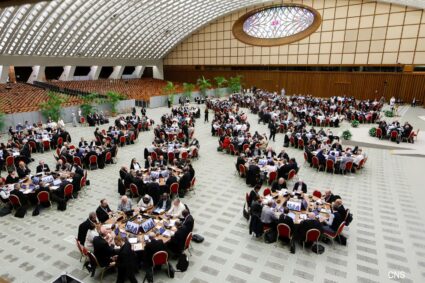
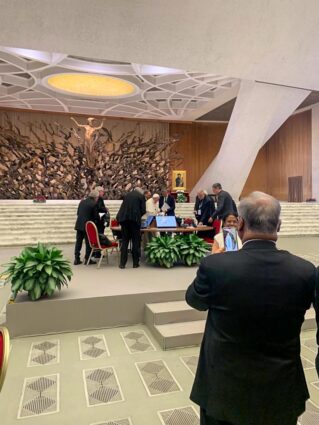
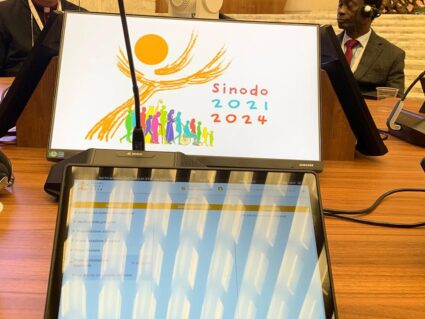
Our discussions are guided by the synod’s Working Document. Last week, we discussed the themes in Module A of the document, and this week, we moved on to the themes of Module B1.
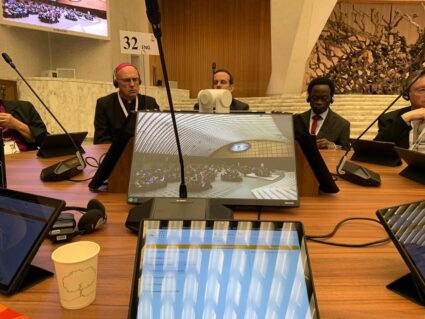
A very important part of the synod process is prayer. So, throughout this time, we’ve had a number of special moments and events that have been very moving.
On Saturday, the Feast of the Holy Rosary, there was a procession with a couple thousand people in St. Peter’s Square. The meditations on the mysteries of the rosary all had to do with the themes of the synod.
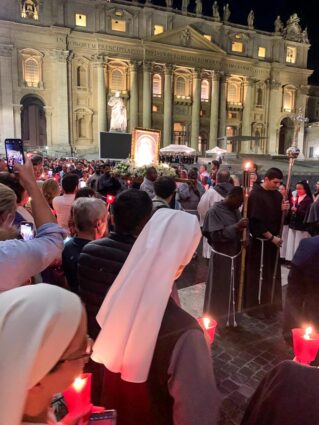
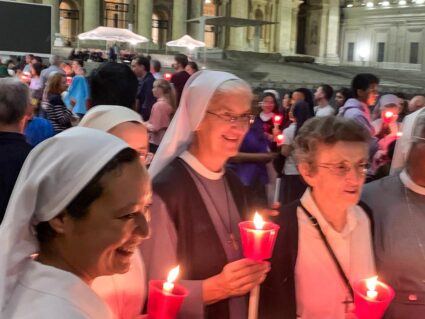
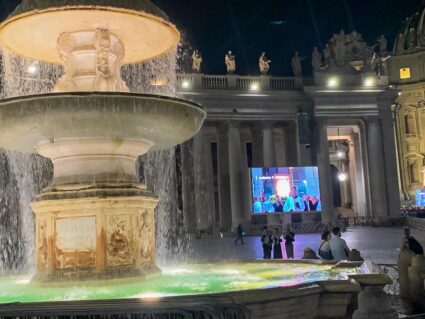
There was an icon of the Blessed Virgin carried by Franciscan friars.
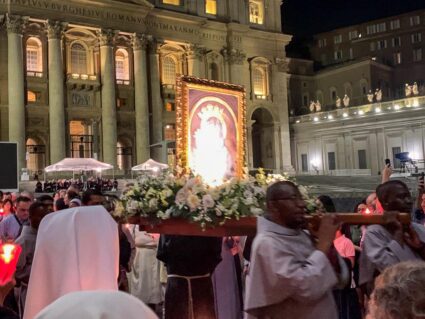
The prayers were led by Cardinal Mario Grech, the secretary general of the synod, and the Vatican Choir accompanied with their beautiful singing. It was very beautiful.
Then, on Monday, we celebrated the Divine Liturgy in St. Peter’s Basilica at the Altar of the Chair. The liturgy was celebrated in the Byzantine Rite with all the patriarchs as the principal concelebrants.
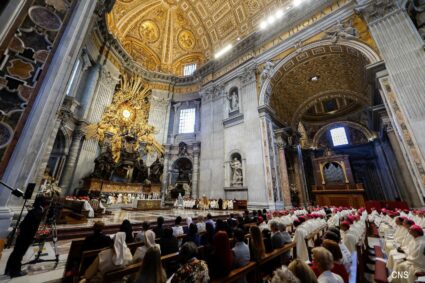
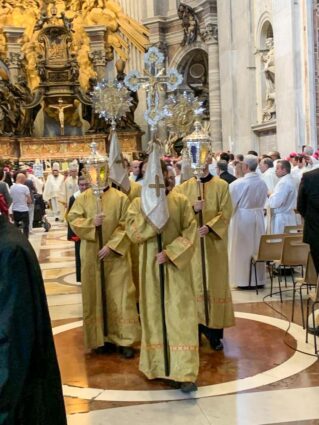
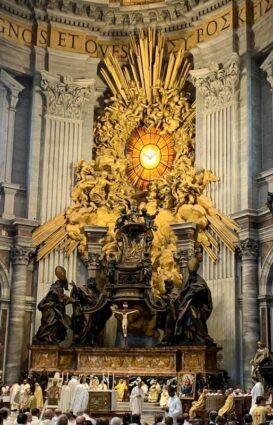
Melkite Catholic Patriarch Joseph Absi presided, and Maronite Patriarch Cardinal Béchara Raï delivered a wonderful homily highlighting the importance of the work of the synod.
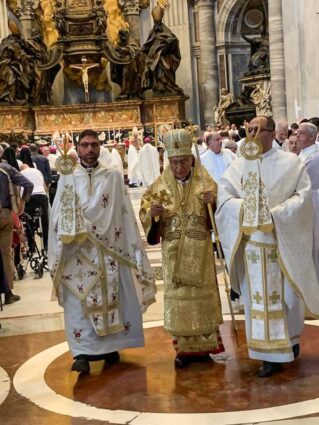
At Morning Prayer on Wednesday, Cardinal Roche of England led the prayers. It was the anniversary of the opening of the Second Vatican Council, and that is the day we celebrate the Feast of Pope St. John XXIII. So, the long reading was from the opening discourse of Pope John XXIII at the council.
I thought it was a very beautiful reading and very fitting for the synod. So, I’d like to share it with you here:
Mother Church rejoices that, by a singular gift of Divine Providence, the most longed-for day has now dawned when, under the patronage of the Virgin Mother of God, whose maternal dignity is commemorated on this feast, the Second Vatican Ecumenical Council solemnly begins here at the tomb of blessed Peter.
Truly, the very serious issues and questions that the human race needs to resolve have not changed after almost twenty centuries. Indeed, Christ Jesus always holds the central place in history and life. People either adhere to him and his Church, and so enjoy the goods of light, sweetness, right order and peace; or else they live without him or act against him and deliberately remain outside the Church. And so they cause confusion among themselves, bitterness in human relationships, and the imminent danger of bloody wars.
At the inauguration of the Second Vatican Ecumenical Council, it is evident, as always, that the truth of the Lord will remain forever. Indeed, as one age gives way to another, we see that uncertain human opinions take over one from another; and often errors vanish as soon as they are born, like mist dispersed by the sun.
The Church has never failed to oppose these errors, and has even condemned them often, indeed with the greatest severity. But at the present time the Spouse of Christ is pleased to apply the medicine of mercy, rather than take up the weapons of severity. She judges it prudent to meet the needs of today by demonstrating more amply the power of her teaching, rather than by condemning. It is not that there is any lack of false doctrines, opinions, and dangers to be guarded against and eliminated; but these are all so openly in conflict with the right principles of honesty and have produced such deadly fruits, that today people seem to have begun to condemn them on their own account, even by naming those ways of living which despise God and his laws or place too much confidence in technological progress and a well-being based solely on the comforts of life. They understand more and more the dignity of the human person and that the need to perfect it is a matter of great importance and very difficult to accomplish. And what is most important, they have at last learned by experience that force exerted on others, the power of arms and political domination are of no use at all in finding a happy resolution to the grave issues which afflict them.
In these circumstances, the Catholic Church, as she raises the torch of religious truth through this Ecumenical Council, wishes to show herself a most loving mother of all, benign, patient, and moved with mercy and goodness towards the children separated from her. To the human race, laboring under so many difficulties, she says, as Peter once said to the poor man who had asked him for alms, I do not have silver and gold, but what I have I give you: in the name of Jesus Christ the Nazorean, arise and walk. That is to say, the Church does not offer to the people of our time riches that perish, nor does she promise them mere earthly happiness, but she imparts the goods of heavenly grace, which, since they raise people to the dignity of the children of God, are powerful safeguards and aids to making their life more human. She opens the springs of her life-giving doctrine, by which people, illumined by the light of Christ, can understand in the depths of their heart what they really are, how excellent is the dignity they possess, and what end they should pursue. Finally, through her children, she extends everywhere the bounds of Christian charity: nothing is more suited to eliminating the seeds of discord, nothing is more effective in promoting harmony, a just peace, and the fraternal unity of all.
Finally, as I like to do when I’m in Rome, I got together with the Boston priests who are currently here. With us for the dinner were Msgr. Bill Fay, Bishop Arthur Kennedy and Father Eric Cadin. Also joining us was William Haughey, director of Veni et Vide catechetical and evangelization program at the Cathedral of the Holy Cross.
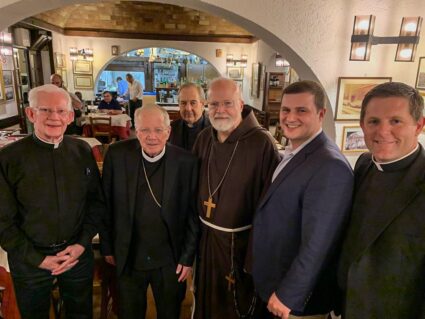
We enjoyed a wonderful meal together, and I was happy to see them all.
Until next week,
Cardinal Seán
